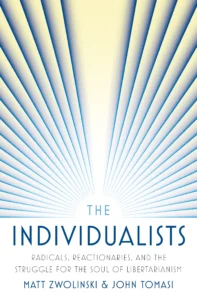
One of my favorite regular book reviewers in the Wall Street Journal is Barton Swaim. In his recent review of Matt Zwolinski’s and John Tomasi’s The Individualists, though, Swaim misses the mark. I hasten to add that I haven’t read Zwolinski’s and Tomasi’s book. But I don’t need to in order to know that Swaim gets things wrong because Swaim’s review is not just of the book but also of libertarianism. And libertarianism is something I know well.
David Boaz of the Cato Institute recently laid out a number of criticisms of Swaim’s review. I recommend reading David’s critique, but I won’t repeat it except where I want to expand on it.
In his first paragraph, Swaim writes that libertarianism “is a wildly diverse and inveterately fractious political tradition whose adherents have taken opposite sides on nearly every important political question.” Nearly every? Really? Certainly there are large differences, especially in the area of foreign policy. But libertarians are virtually united in opposing slavery, a pretty important political question, conscription, which is the modern version of slavery, high taxes, a large welfare state, high government spending, extensive regulation of the market, price controls, and government spending on higher education. These are pretty important issues. Can you find someone who claims to be libertarian who opposes the libertarian consensus on these issues? Maybe, although I haven’t met the person. But Swaim gives the impression that there are large swaths of self-proclaimed libertarians who argue with each other about “nearly every important political question.” That’s just not so.
Swaim also writes:
A polity, if it’s to function and endure, must offer its members a reason to remain attached, in their loyalties and affections, to the collective. That requires some engagement with ultimate questions—questions about the good life, morality, religious meaning, human purpose and so on. Modern libertarians are allergic to all such topics. Almost the only figures who mention such things in “The Individualists”—Adam Smith, William Lloyd Garrison—lived and died in the 18th or 19th century.
It’s simply false that libertarians have not contended with these issues. We are not allergic to these topics; we often discuss them. But one of the virtues of libertarianism is that we are tolerant of people who come to different views on these topics. Many libertarians are Christians, Jews, or Muslims. A minority of libertarians are atheist or agnostic. But no libertarian I know of–and I know many hundreds–advocates a state religion. That’s one of those many “important political questions” that we don’t argue about. Boaz has a nice treatment of this issue.
Even with all his criticisms, Swaim never makes the case or even tries to, that libertarianism is dead. He might wish that to be true, although I don’t know him and so I can’t say.
Why do I mention this? Because of the last line of his review:
The book also works as an obituary.
Swaim seems to have intended that as a mic drop. Mic drops work only if you’ve laid the ground work that leads to the conclusion. He hasn’t come close.


READER COMMENTS
Dylan
Jul 4 2023 at 1:07pm
Ehh…I don’t know, I’d tend to give some literary license here. It’s true that most libertarians agree on the issues you mentioned…but the first two are things that pretty much everyone regardless of party believes in these days, the next 3 are both ambiguous (how do we define high or large?) and pretty closely related to one another. Price controls and government spending on higher education are the only two that seem specific and I’m guessing that I wouldn’t have to look too hard to find someone that broadly fits under the libertarian camp* that has supported one or both of these.
For evidence to support Swain’s claim, I’d point you to the comment section on any Reason article, where you’re hard pressed to find a single article where the majority of the commenters agree with the opinion of the author. Or, take the recent EconTalk episode with Mike Munger on “directionists” vs “destinationists.” I’ve had anarcho-capitalists types argue with me against supporting a bill that would reduce taxes because “taxes are theft and shouldn’t exist in the first place.”
You seemed to only respond to the 2nd part of the statement but ignored the first. I think it is the existence of the collective that libertarians tend to be allergic to. I mean, how many columns has Pierre written about misusing the term “we” or referring to “Germany” when we mean the “German government?”
*another thing about libertarians is that they tend to be so individualistic that they don’t even want to apply the libertarian label to themselves
David Henderson
Jul 5 2023 at 5:22pm
You write:
True, but that’s not responsive to my point. Libertarians were prominent in eliminating slavery and eliminating the draft. So if people have come to agree with us, that counts as a win for libertarianism (and the opposite of an obituary). Also the fact that people agree with us doesn’t mean that libertarians disagree with each other. Remember the quote from Swaim that I responded to.
You write:
Not that ambiguous. Pretty much every libertarian, I think, would favor cutting government spending at the federal level to at most 20% of GDP. Yes, they’re related. So what? They’re major issues that libertarians agree on.
You write:
That’s at best weak evidence. The Reason comment section is a dumpster fire where people flame each other, say absurd pro-Trump things, etc. There’s not much evidence that they’re libertarians.
You write:
Guilty as charged. The reason, though, is not that I agree with Swaim but that spelling out how communities can achieve goals without coercion would have taken too much space. But if you’re interested, start with David Beito’s work on fraternal organizations. Or look at examples where do-gooders try to feed poor people and get shut down by governments. It’s government in those cases that destroys community.
Mark Brady
Jul 4 2023 at 1:42pm
I’m certainly not writing to defend Barton Swaim’s review of Zwolinski and Tomasi’s The Individualists, and David Boaz makes many pertinent observations in his response. Rather I’m writing to explore what David writes here:
“But in fact the world is far freer in this century than ever before in history. Free markets and free trade, an end to slavery and caste societies, representative government, and the rule of law now govern the Western world and much of the rest. Most of the Cato Institute’s website comprises complaints about the malfeasance of the U.S. government. But in the bigger picture, libertarians have had much success.” (Emphasis added)
Scroll down and David grants that “In various parts of the world bad ideas are back—socialism, protectionism, ethnic nationalism, anti‐Semitism, even industrial policy.”
Yes, many more people are now far freer–and more prosperous–than ever before in history. But that’s because of the dissemination of classical liberal ideas and economic development in the past several hundred years, and this transcends the achievements of self-identified libertarians in our lifetimes. Indeed one can argue that in significant respects individual liberties in the West have declined since our youth, and that for large segments of the population in the U.S. and the UK, the material standard of living has not risen in recent years.
David Henderson
Jul 5 2023 at 5:52pm
You write:
Yes, one can argue that.
On the first point, about liberty, I think that’s correct. I think that on average we are less free than, say, in 1988. (There are segments that are freer: think of men and women who want to marry people of the same gender.)
On the second point, while one can argue that large segments of the U.S. and U.K. have a stagnant material standard of living, one would be wrong. I can provide references if you’re interested, although most of what I know is U.S., not U.K.
Ahmed Fares
Jul 4 2023 at 3:58pm
There’s an interesting graph in an article in the New York Times titled: “Ron DeSantis and the ‘Scaffle’ Vote”. Because the article might be gated, I link instead to the graph in an article by Greg Mankiw titled: “A Lonely Place to Be”. Here is a link (the New York Times link is in Greg’s article, so no need to post it here):
http://gregmankiw.blogspot.com/2023/05/a-lonely-place-to-be.html
I see myself in the bottom-right quadrant, i.e., fiscally conservative socially liberal, which I think means that I’m somewhat a libertarian. I’m surprised at how few people are in that quadrant.
MarkW
Jul 5 2023 at 9:44am
It is interesting, but I guess I wouldn’t take one chart as definitive, especially as what counts as ‘socially conservative’ and ‘socially liberal’ has changed pretty significantly in recent decades. Large numbers/majorities of ‘social conservatives’, for example, are now in favor of legal marijuana, and interracial & gay marriage (which isn’t to say they approve if all those things — only that they favor not outlawing them). At the same time ‘free speech’ has become more a ‘conservative’ than ‘progressive’ position. The lower left and upper right quadrants are overrepresented because that’s where the two teams are centered (and most people want to be members of one major ‘tribe’ the other) — but the actual positions of those tribes (and, therefore, what currently counts as ‘conservative’ or ‘progressive’) has shifted.
Knut P. Heen
Jul 6 2023 at 1:12pm
I think many people want to ban anything they don’t like. Some people have realized that if I ban other people’s annoying habits then they may want to ban my annoying habits. Classical liberalism then arise as a useful compromise. I don’t ban your habits in exchange for you don’t ban mine. This is also the reason why attitudes towards free speech for example change over time (as MarkW correctly points out above). Back in the 1970s, free speech was about criticizing the bible, church, etc. something the left loved to do. For example, Monty Python’s Life of Brian was banned in many countries for blasphemy. Hence, free speech was something the left was concerned about. Today, free speech is about criticizing the modern religions the left believes in. Hence, free speech is something people on the right is concerned about. Everyone wants to speak freely, but they want to ban speech they don’t want to hear.
I think of classical liberalism more as a rational choice (or trade) than a political movement. This is the reason why members of the group often have different preferences in so many areas. Political movements are coalitions of people with similar preferences who want to ban behavior they don’t approve of. Swaim is criticizing classical liberals for not being a political movement in that sense. He may be right, but that is not the point of it either.
Mark Z
Jul 7 2023 at 2:17am
“Modern libertarians are allergic to all such topics.”
A virtue, not a vice, because those questions generally should not be political questions. That Leninists and Francoists in contrast were so invested in their ideas about the meaning of life or religion and how they relate to politics were not redeeming qualities.
K.D. Walter
Jul 9 2023 at 2:53pm
There is a rich tradition of leftist anarchists calling themselves libertarians, even before we capitalists started doing it, apparently. So Swaim’s statement that libertarians “have taken opposite sides on nearly every important political question” might be defensible, though probably not for the reason he meant.
Roger McKinney
Jul 13 2023 at 10:42am
I don’t know why it’s so hard for people to understand libertarianism. It ain’t rocket surgery. It seems to me that Murray Rothbard invented the term to describe pre-war conservatives to distinguish them from neo-cons. Hayek wrote in “Why I’m not a conservative” that he didn’t like the term and preferred to call himself a classical libera. Ayn Rand hated libertarians and considered them sellouts. Many calling themselves libertarian never learned what the term means.
Comments are closed.